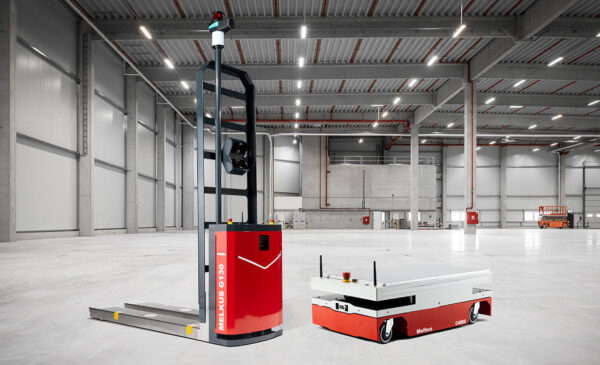AGVs with a strategic advantage in maintenance, adaptability and system integration
Automated guided vehicles are taking on more and more central functions in intralogistics. This raises the demands on their flexibility, availability and future viability. Melkus Mechatronic is responding to this development with a consistently modular vehicle concept, including not only the mechanics and control hardware but also the on-board software developed entirely in-house. The result is autonomous transport systems with maximum ease of maintenance and high availability.

More and more companies are using automated guided vehicles (AGVs) for internal transport tasks. Long downtimes are unacceptable. Having alternatives available for emergencies would cancel out the automation gains and is often not even possible. AGVs therefore need extremely high values of availability and reliability.
“One key to long-term high reliability is the use of high-quality materials, combined with mechanical
designs that can cope with the challenges of everyday operation, such as uneven ground,” explains
Martin Lindner, CEO of the independent Austrian AGV manufacturer Melkus Mechatronic. “Another is
a consistently modular design of the vehicles, as this simplifies and speeds up maintenance, repairs
and subsequent adjustments, thus ensuring short downtimes.” This is why a fully modular AGV design
is at the heart of the Melkus philosophy.
Modularity enhances investment security
All key components of Melkus Mechatronic AGVs are designed as self-contained, industrial-grade modules, many of which are installed in all vehicles from this manufacturer. This applies not only to the
robust, industrial-grade drive unit, the Melkus turntable, which enables all Melkus vehicles to drive
omnidirectionally. It also applies to the lifting unit, the traction battery, the control unit and the sensors,
and even to the vehicle software. Like most vehicle parts, all mechatronic modules can be replaced quickly and without special tools on site by customer personnel after brief training. In addition, the
modular design with a high proportion of identical parts, together with the identical design of both skids
for driverless forklift trucks, significantly reduces the cost of stocking spare parts.
In addition to simple maintenance, modularity is the key to long-term investment security. It enables quick, even subsequent customisation to individual customer requirements, such as load handling devices or attachments.
Modular control hardware and software
This applies in particular to the central control hardware. This is not a low-quantity custom design, but
a modular industrial control system from Sigmatek that has been tried and tested tens of thousands of
times in industrial applications. Consisting of stackable modules for CPU, safety and input/output modules, it not only enables fast module replacement in the event of a fault, but also the integration of
new technologies, such as additional sensors.
Thanks to object-orientated programming, the on-board software, entirely developed in-house, is also
completely modular. Connecting and configuring standardised object classes not only simplifies and
accelerates the creation of the target software for the individual vehicle. It also facilitates
troubleshooting, software maintenance and continuous improvement as well as testing and
commissioning. As part of its future-orientated approach, Melkus uses open standards such as the
VDA 5050 interface to connect to any control system, regardless of its manufacturer.
“Customers need practical systems with maximum availability,” concludes Martin Lindner. “This is
exactly where our modular approach comes in. We deliver maximum efficiency with minimum
downtime.”
For more information visit: melkus-mechatronic.com
News Categories
- » NEWS HOME
- » Automation & Robotics
- » Industry 4.0
- » Material Handling
- » Sensors
- » Quality & Testing
- » Machine Vision
- » Laser & Optics
- » Metalworking
- » Motion Control & Drives
- » Hydraulics & Pneumatics
- » Process Industry
- » Renewable Energy
- » Agriculture
- » Home & Office Furniture
- » Additive Manufacturing
- » Environmental Tech



